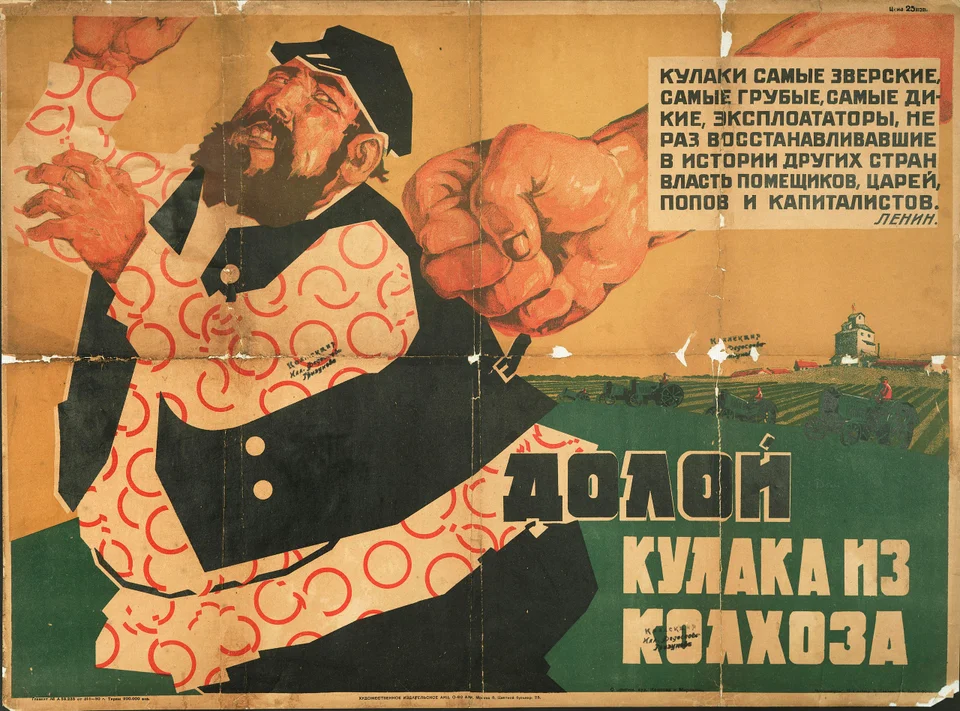m (Poster.) Tag: Visual edit |
No edit summary Tag: Visual edit |
||
| Line 1: | Line 1: | ||
[[File:Anti-kulak poster.png|thumb|"Oust the kulak from the [[kolkhoz]]]] | [[File:Anti-kulak poster.png|thumb|"Oust the kulak from the [[kolkhoz]]]] | ||
'''Kulaks'''<ref group="lower-alpha">Russian: Кулак; Ukrainian: Куркуль; Azerbaijani: ''qolçomaq''</ref> were wealthy [[Feudalism|feudal]] landowners in the [[Russian Empire (1721–1917)|Russian Empire]] and early [[Union of Soviet Socialist Republics (1922–1991)|Soviet Union]]. During [[collectivization]], they burned crops and destroyed farm equipment.<ref>{{Citation|author=Walter Duranty|year=1949|title=Stalin & Co|city=[[New York City]]|publisher=W. Sloane Associates}}</ref> They also killed millions of livestock; the number of horses decreased from 30 million to under 15 million, cattle decreased from 70 million and 31 million, goats and sheep decreased from 147 million to 50 million, and hogs decreased from 20 million to 12 million.<ref>{{Citation|author=Ludu Martens|title=Another View of Stalin|page=108|pdf=https://stalinsocietypk.files.wordpress.com/2013/05/another-view-of-stalin1.pdf#page107|publisher=[[Stalin Society]]}}</ref> The Soviet rural economy did not recover from the kulaks' sabotage until after the [[Great Patriotic War]]. | '''Kulaks'''<ref group="lower-alpha">Russian: Кулак; Ukrainian: Куркуль; Azerbaijani: ''qolçomaq''</ref> were wealthy [[Feudalism|feudal]] landowners in the [[Russian Empire (1721–1917)|Russian Empire]] and early [[Union of Soviet Socialist Republics (1922–1991)|Soviet Union]]. During [[collectivization]], they burned crops and destroyed farm equipment.<ref>{{Citation|author=Walter Duranty|year=1949|title=Stalin & Co|city=[[New York City]]|publisher=W. Sloane Associates}}</ref> They also killed millions of livestock; the number of horses decreased from 30 million to under 15 million, cattle decreased from 70 million and 31 million, goats and sheep decreased from 147 million to 50 million, and hogs decreased from 20 million to 12 million.<ref>{{Citation|author=Ludu Martens|title=Another View of Stalin|page=108|pdf=https://stalinsocietypk.files.wordpress.com/2013/05/another-view-of-stalin1.pdf#page107|publisher=[[Stalin Society]]}}</ref> The Soviet rural economy did not recover from the kulaks' sabotage until after the [[Great Patriotic War]]. | ||
== Elimination of the kulaks == | |||
In 1929, the Soviet government banned renting land and private hiring of labor. It allowed [[Peasantry|peasants]] to expropriate kulaks and take their cattle, machines, and other farming equipment to use in collective farms. By 1936, the kulaks had been completely eliminated.<ref>{{Citation|author=[[Joseph Stalin]]|year=1939|title=History of the Communist Party of Soviet Union (Bolsheviks)|title-url=http://www.marx2mao.com/Other/HCPSU39NB.html|chapter=The Bolshevik Party in the Struggle for the Collectivization of Agriculture|chapter-url=https://www.marxists.org/reference/archive/stalin/works/1939/x01/ch11.htm|city=New York|publisher=International Publishers}}</ref> | |||
== Notes == | == Notes == | ||
Revision as of 21:32, 8 October 2022

Kulaks[a] were wealthy feudal landowners in the Russian Empire and early Soviet Union. During collectivization, they burned crops and destroyed farm equipment.[1] They also killed millions of livestock; the number of horses decreased from 30 million to under 15 million, cattle decreased from 70 million and 31 million, goats and sheep decreased from 147 million to 50 million, and hogs decreased from 20 million to 12 million.[2] The Soviet rural economy did not recover from the kulaks' sabotage until after the Great Patriotic War.
Elimination of the kulaks
In 1929, the Soviet government banned renting land and private hiring of labor. It allowed peasants to expropriate kulaks and take their cattle, machines, and other farming equipment to use in collective farms. By 1936, the kulaks had been completely eliminated.[3]
Notes
- ↑ Russian: Кулак; Ukrainian: Куркуль; Azerbaijani: qolçomaq
References
- ↑ Walter Duranty (1949). Stalin & Co. New York City: W. Sloane Associates.
- ↑ Ludu Martens. Another View of Stalin (p. 108). [PDF] Stalin Society.
- ↑ Joseph Stalin (1939). History of the Communist Party of Soviet Union (Bolsheviks): 'The Bolshevik Party in the Struggle for the Collectivization of Agriculture'. New York: International Publishers.